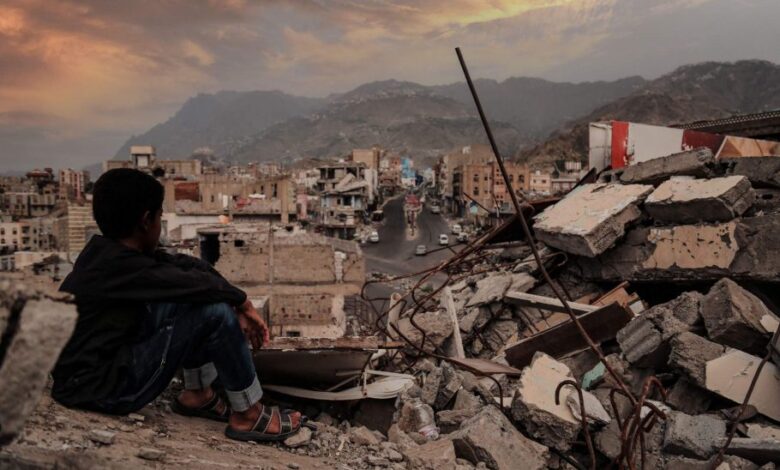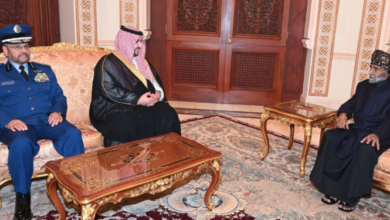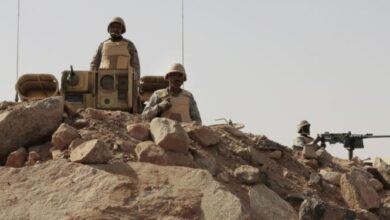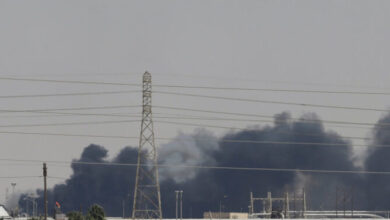After six years of war in Yemen Saudi Arabia is Forced to Offer A ‘Peace’ Solution

Six years have passed since Saudi Arabia led a military coalition to combat an insurgency from Iran-backed Houthi rebels in Yemen, yet nothing but sheer destruction and humanitarian anguish has resulted from the war.
Saudi Crown Prince Mohammad bin Salman, who launched the war in March 2015 as Saudi Minister of Defence, has surely realised that he has lost the war in Yemen. The Houthis have become more powerful in northern Yemen, with Tehran becoming a stronger external player, while Riyadh has expended upwards of $100 billion and acquired a tarnished diplomatic image to show for it.
I have witnessed people eating tree leaves to survive. These bad events will not go easily from my mind and I think they will last for the rest of my life.
Ahmad Algohbary
Now, with Saudi Arabia’s partner Washington breathing down bin Salman’s neck, after US President Joe Biden pledged to end “relevant” arms sales to Riyadh on February 4, the Saudi kingdom has been forced to fumble for a peace initiative.
The deal it proposed on March 22 offered a ceasefire to the Houthis, and an easing of its land, air and sea blockade on Yemen. The UN and US envoys to Yemen, Martin Griffiths and Timothy Lenderking, met Houthi representatives in Oman following the announcement to advance peace talks.
The Dual Threat of Famine and COVID-19
However, many Yemenis are still feeling the devastating impact of the conflict and believe that Saudi Arabia’s proposal will not suddenly alleviate the country’s problems.
Ahmad Algohbary is among the many Yemen-based activists who have tried to inform the world of the country’s plight, using Twitter to showcase highlight the impact of the war. He has also highlighted how Yemenis are malnourished and struggling and has raised money to buy essential medicines for impoverished Yemeni children.
“Yemenis are happy to hear that there could finally be a peace plan. But many people here still fear that Saudi Arabia may not uphold the agreement,” he told Byline Times.
Even if Saudi Arabia, its ally the United Arab Emirates, and Iran do withdraw from Yemen, he warns that the country will struggle to recover, and that these events have scarred him and other Yemenis.
With aid groups warning that Yemen is edging closer towards widespread famine, the Coronavirus is once again rearing its ugly head. It previously spread undetected but has potentially killed thousands and infected millions in the first wave last year. A collapsed healthcare system after six years of repeated targeting from warring sides has enabled this.
Médecins Sans Frontieres (MSF) warned on March 25 that a drastic influx of critically ill patients have gone into hospitals in Aden, the unofficial capital of Yemen’s internationally recognised government.
After six long years of inconceivable suffering, war, famine and COVID, Yemen cannot wait any longer for this war to end.
“Many of the patients we see are already in a critical condition when they arrive,” says Line Lootens, MSF medical coordinator in Yemen. “Most patients need very high levels of oxygen and medical treatment. Some patients also require mechanical ventilation in the ICU, which is technically difficult and requires a very high level of care.”
Though MSF has encouraged social distancing, mask wearing, many Yemenis simply cannot afford to worry about the pandemic, one UN aid worker said. Those with shelter often live with extended family in just one room, with scarce access to tap water, and are often forced to choose between buying rice and soap.
US Military Support
With a shortage of international donations and countries not meeting their previous aid pledges to Yemen, UN Secretary-General Antonio Guterres on 1 March warned that millions of Yemeni children, women, and men face a death sentence as a result. This included the UK Government’s cutting of aid to Yemen by 50% in February.
Manal, a resident of Hodeidah, said even amid uncertainty of the conflict’s future, Yemenis are desperate for any solution to alleviate the humanitarian crisis.
“We are thinking anxiously about how long we will remain under the war. Are there another six years or ten more, and will we remain alive until it ends?” she told Byline Times.
“Yemen does not ask for much. We just want to have a normal life.”
Many Yemeni Americans from afar who campaigned to end US support for Saudi Arabia’s war feel that Washington’s will not guarantee a lasting end to the war and the humanitarian crisis. After all, it is not clear to what extent the US will end its military support.
“It’s not a new ‘peace plan’, it is same old proposal, repackaged,” Jehan Hakim, Chair of the Yemeni Alliance Committee, told Byline Times, referring to past Saudi proposals for Yemen which had not materialized.
“After six long years of inconceivable suffering, war, famine and COVID, Yemen cannot wait any longer for this war to end. The Biden administration must make fully ending U.S. support for the world’s worst humanitarian crisis a foreign policy priority. It is a moral imperative that the international community steps up and supports a peace agreement that is in the interest of the Yemeni people.”
Aisha Jumaan, head of the Yemen Relief and Reconstruction Foundation, told Byline Times that even if Saudi Arabia ends its bombing campaign, peace efforts cannot be taken seriously while the suffocating blockade remains.
The blockade on Hodeida’s port and the capital Sanaa’s airport has cut off vital commercial goods, medicines, and fuel, even though Saudi Arabia imposed it on the grounds of preventing Iranian weapons reaching the Houthis and protecting its own national security.
Aside from supporting ending the blockade, Algobary calls for more international support for a peace solution, otherwise current initiatives may not last and allow Yemen to achieve stability again.
“I think that the solution is to support Yemeni internal dialogue and that the United States of America and all western countries should support this dialogue and stop fuelling this war,” he said.
Source: The Byline Times





